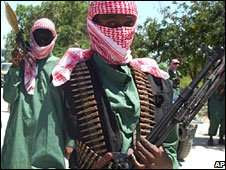 Islamists again control much of Somalia
Islamists again control much of SomaliaRival Somali politicians have agreed to an international investigation into atrocities committed during the 17-year civil war, a UN envoy has said.
"Time will not erase atrocities," envoy Ahmedou Ould Abdallah told the BBC.
He said peace talks between the government and one Islamist faction, taking place in neighbouring Djibouti, were making progress on sharing power.
Somalia has not had an effective national government since 1991 and has been wracked by conflict.
Mr Abdallah said the recent rise in piracy had shown that a solution had to be found to Somalia's problems.
Almost half of Somalia's population - three million people - need food aid, donors say.
Ethiopian pull-out
The peace talks resumed on Monday.
"We will not have peace overnight," Mr Abdallah admitted, but said that many people had been sceptical about bringing justice and reconciliation to other war-torn countries, such as Rwanda and Liberia.
Delegates at the talks have already agreed that Ethiopian troops, who intervened to help government forces oust the Islamists two years ago, should withdraw next month.
Their pull-out was due to start on Friday but there was no visible sign of any movement.
Instead, Islamist fighters staged an attack on an official's residence, leaving at least 15 people dead.
The UN Security Council on Thursday unanimously passed a resolution imposing sanctions - an assets freeze and travel ban - on anyone threatening peace in Somalia.
"The prime goal of this is to provide a framework to stem the flow of arms into Somalia, which is causing such mayhem there," said John Sawers, the UN ambassador of the UK, which drafted the resolution.
The resolution also mentions anyone disrupting aid deliveries.
Somalia's President Abdullahi Yusuf last week admitted that Islamists now control most of the southern part of the country.
"Time will not erase atrocities," envoy Ahmedou Ould Abdallah told the BBC.
He said peace talks between the government and one Islamist faction, taking place in neighbouring Djibouti, were making progress on sharing power.
Somalia has not had an effective national government since 1991 and has been wracked by conflict.
Mr Abdallah said the recent rise in piracy had shown that a solution had to be found to Somalia's problems.
Almost half of Somalia's population - three million people - need food aid, donors say.
Ethiopian pull-out
The peace talks resumed on Monday.
"We will not have peace overnight," Mr Abdallah admitted, but said that many people had been sceptical about bringing justice and reconciliation to other war-torn countries, such as Rwanda and Liberia.
Delegates at the talks have already agreed that Ethiopian troops, who intervened to help government forces oust the Islamists two years ago, should withdraw next month.
Their pull-out was due to start on Friday but there was no visible sign of any movement.
Instead, Islamist fighters staged an attack on an official's residence, leaving at least 15 people dead.
The UN Security Council on Thursday unanimously passed a resolution imposing sanctions - an assets freeze and travel ban - on anyone threatening peace in Somalia.
"The prime goal of this is to provide a framework to stem the flow of arms into Somalia, which is causing such mayhem there," said John Sawers, the UN ambassador of the UK, which drafted the resolution.
The resolution also mentions anyone disrupting aid deliveries.
Somalia's President Abdullahi Yusuf last week admitted that Islamists now control most of the southern part of the country.
Samira Hassan

No comments:
Post a Comment